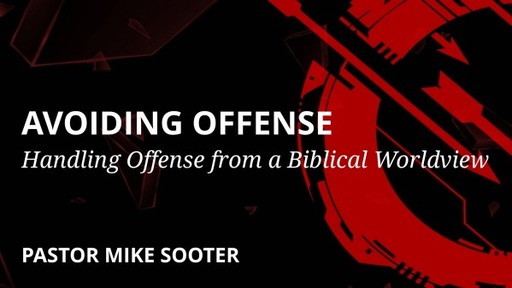Avoiding Offense

Notes
Transcript
OFFENSE IS A TERM USED to describe anger or hurt caused by someone else’s words or actions. Offenses are unavoidable in this life, whether perceived or intentional. As Apostolic Pentecostals, we believe the Bible provides us with guidance on how to handle offense in our lives. Jesus told the disciples, “It is impossible that no offenses should come, but woe to him through whom they do come!” (Luke 17:1, NKJV).
Then He said to the disciples, “It is impossible that no offenses should come, but woe to him through whom they do come!
It is vital that we take note of the meaning of the word “offense” in this text.
How would you define “offense?”
How would you define “offense?”
It is translated in Greek as skandalon, meaning the movable
skandalon - trigger of a trap on which the bait is placed, and which, when touched by the animal, springs and causes it to close causing entrapment
Skandalon involves a reference also to the conduct of the person who is thus trapped [and] always denotes an enticement to conduct which could ruin the person in question” (The Complete Word Study Dictionary New Testament).
In one short verse Jesus addressed both sides of the issue: the person who took offense and the person who committed the offense. Offenses are a snare to both parties.
The Offended Person
The Offended Person
1. The offended person is tempted to retaliate or react in some negative way. If he succumbs to the temptation, his feelings and actions spring the trap and he is caught in the snare. In verse 2, Jesus referred to the offended parties as “little ones.” Most Bible commentators agree this refers to weaker brothers or sisters; however, it also can refer to children.
It would be better for him if a millstone were hung around his neck, and he were thrown into the sea, than that he should offend one of these little ones.
What offenses is Jesus talking about?
What offenses is Jesus talking about?
Whether the offense is a false teaching or subtle attempt to mislead, a personal dig, a criticism, or any other cause (whether perceived or real), if the offended party harbors the offense and gorges on self-pity or resentment, it becomes difficult to remedy the offense.
The Offender
The Offender
2. On the other hand, Jesus indicated that the offender’s predicament is just as dangerous. Causing offense—the kind Jesus was describing—is a serious transgression. Thus, it is vital that a strong, influential person be aware that some others may be weaker—susceptible to suggestion, inuendo, misunderstanding, criticism, or many other kinds of traps, including thoughtless comments and unintentional slights. The apostle Paul stressed in I Corinthians 10:23–24 (NIV) that stronger brothers and sisters have a responsibility toward others:
“I have the right to do anything,” you say—but not everything is beneficial. “I have the right to do anything”—but not everything is constructive. No one should seek their own good, but the good of others.
“‘I have a right to do anything,’ you say—but not everything is beneficial. ‘I have a right to do anything’—but not everything is constructive. No one should seek their own good, but the good [NKJV says “well-being”] of others.”
What can you do to put the well being of others first?
What can you do to put the well being of others first?
Thankfully, the Word of God doesn’t leave us to be pummeled with unrelenting offenses while we wait for the Lord to say, “That’s enough!” It provides tools to combat offense. In Matthew 18:15–17, Jesus taught that if someone sins against you, it should not be discussed behind the offender’s back; it should be addressed face-to-face with the offender. If wrongdoing is rebuked in a non-accusatory way (without harshness, blame, or condemnation), it can open the door to repentance and forgiveness. If the person refuses to listen, however, the offended party should take the matter to one or two others (verse 16). If the person still refuses to listen, the offended party should bring the matter before the church. The goal is to bring about repentance and reconciliation as early as possible in the process.
Another passage that speaks to this issue is Proverbs 19: 11 (NIV): “A person’s wisdom yields patience; it is to one’s glory to overlook an offense.”
Good sense makes one slow to anger, and it is his glory to overlook an offense.
This verse encourages us to exercise self-control and avoid becoming quickly angered when someone offends us. Instead, we should strive to overlook the offense and show grace and mercy to the person who has wronged us.
Why should we “overlook an offense?”
Why should we “overlook an offense?”
Remember, our goal is to reconcile.
Offense is an issue many individuals in the Bible faced. One example is found in the story of Joseph in the Book of Genesis. Joseph’s brothers were jealous of him and sold him into slavery. Despite this betrayal, Joseph forgave his brothers and worked toward reconciliation.
Another example is found in the life of Jesus. Throughout His ministry, Jesus faced constant opposition and offense from those around Him. He was falsely accused, mocked, and ultimately crucified. Despite this, Jesus responded with love and forgiveness, even praying for His persecutors.
These examples and teachings show us the importance of forgiveness and reconciliation in the face of offense. We should always strive to respond with love and grace, even when difficult.
Offense is a common experience we all face at some point in our lives. However, as Apostolic Pentecostals, we believe the Bible guides us in handling offense in a way that honors God. By following the example of Jesus Christ and striving to respond with love and forgiveness, we can overcome offense and work toward reconciliation with those who have wronged us. PL
